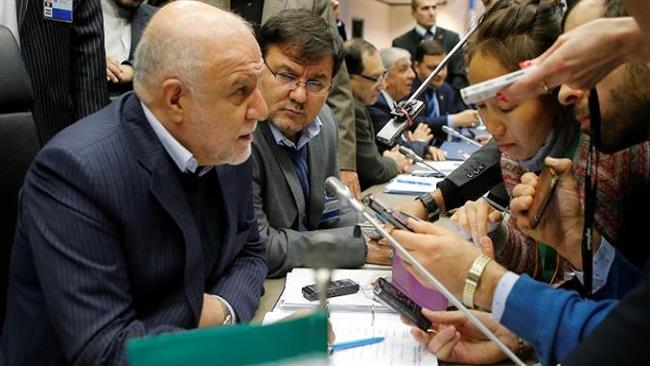The negotiations culminated in a deal in Vienna on Wednesday for most producers to reduce their production by a collective of by 1.2 million barrels per day (mb/d) but exempted Iran from any production cuts – what the country had insisted on since Saudi Arabia raised the OPEC production cut proposal earlier this year.
OPEC – in its first production deal in eight years – even agreed to allow Iran to increase its crude oil production by 90,000 barrels per day (bpd) from January 2016 – when the deal becomes effective.
“This was the biggest achievement of the 171st ministerial meeting of OPEC for Iran and a result of the powerful diplomacy of the country’s Petroleum Minister [Bijan Zanganeh] in the post-sanctions environment,” wrote the Persian-language newspaper Iran in a front page editorial.
In an article titled “Iran’s JCPOA in Vienna”, the Persian-language newspaper Arman-e Emrooz said the exemption given to Iran was the triumph of the country’s oil diplomacy and a key move to revive its position in oil markets.
The JCPOA – the Joint Comprehensive Plan of Action – was achieved between Iran and the five permanent members of the Security Council plus Germany last summer. It envisaged the removal of a series of economic sanctions against Iran in return for steps by the country to restrict certain aspects of its nuclear energy activities. The JCPOA is praised in Tehran as a major diplomatic breakthrough by the administration of President Hassan Rouhani to end years of sanctions against the country.
Arman-e Emrooz emphasized that the purpose of the Saudi proposed production cut plan was to stop Iran’s return to oil markets after the removal of the sanctions.
“Throughout the years that Iran was under the sanctions, most of Iran’s share of oil markets was seized by Saudi Arabia,” it wrote in its editorial. “If any attempt should be taken to remove the oil market glut, it is Riyadh that needs to reduce its production instead of raising the oil freeze plan to portray Iran as responsible for the falling oil prices.”
Saudi Arabia, itself, agreed to cut its production by 486,000 bpd and pledged to produce 10 million barrels per day (mb/d) from January 2017.
Saudi Energy Minister Khalid al-Falih said ahead of the meeting that the kingdom was prepared to accept “a big hit” on production to get a deal done.
“I think it is a good day for the oil markets, it is a good day for the industry and … it should be a good day for the global economy. I think it will be a boost to global economic growth,” he told reporters after the decision, as quoted by Reuters.
Arman-e Emrooz newspaper emphasized in its editorial that Saudi Arabia had raised the oil freeze plan at a time that itself had already reached its maximum production capacity and was unable to further increase its output.
“In other words, Saudi Arabia had already violated the OPEC quota and had been producing at unauthorized high levels,” the daily added.
Another Iranian newspaper – Hamshahri –underscored the role of diplomatic negotiations in OPEC’s “historic” deal.
It highlighted a telephone conversation between the presidents of Iran and Russia on the eve of the OPEC meeting.
“The results of this telephone conversation emerged in the days leading to the Organization’s meeting. Only two days before the meeting, the Saudi energy minister had warned that he would leave the negotiations and said he would not accept to see Iran exempted from the output freeze plan. But he said just before the OPEC meeting that he has no objections to Iran’s plans to increase its production to pre-sanction levels. He also said he would accept to exempt Iran from the production freeze plan,” wrote Hamshahri.
“This showed that the only opponent to exempting Iran from the oil freeze plan had accepted Iran’s conditions; what eventually paved the way for the big oil agreement.”
Iran newspaper further emphasized that the OPEC deal was an important achievement for the Organization, itself. “OPEC showed that it is still an integrated organization and can help the situation of the markets through forming unity among its member states,” it wrote in its editorial.
Arman-e Emrooz also praised OPEC for arriving at a solution to help stabilize the prices after lengthy negotiations.
“OPEC member states – regardless of political issues – proved that they can still make hard decisions in difficult times and play an important role in world’s energy markets,” it further wrote in its editorial.
